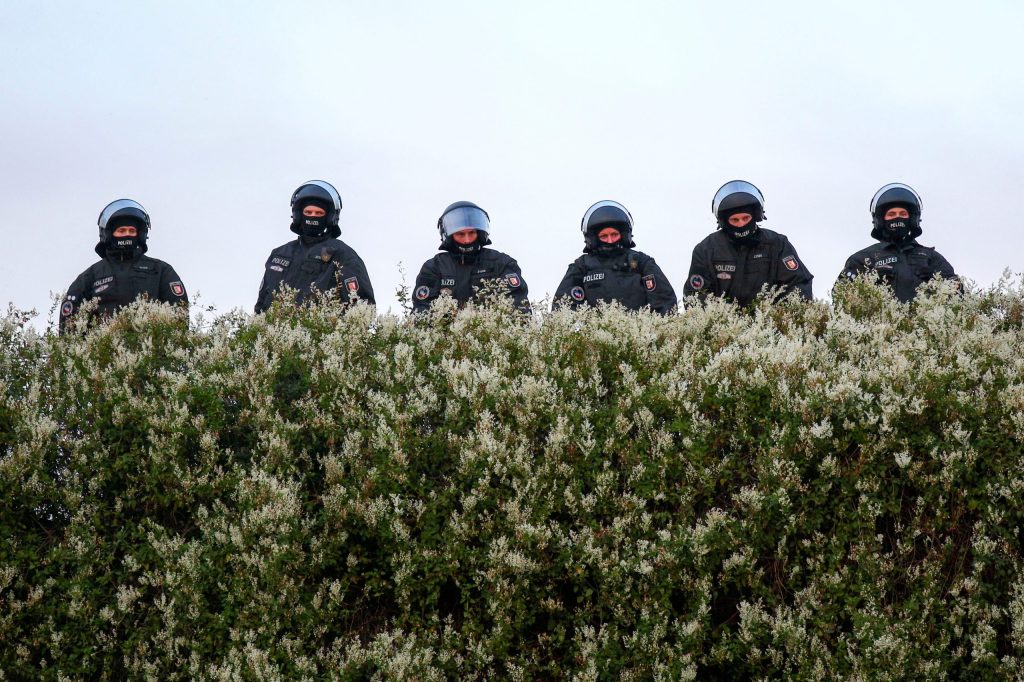On June 2, 2019, a German politician was found lying in a pool of blood outside his home in Hesse. He had been shot in the head at close range with a .38 Rossi revolver. Walter Lübcke, the 65-year-old leader of Kassel city council, who had been a vocal supporter of Germany’s immigration policy, had been assassinated by a German member of the British neo-Nazi group Combat 18. On Tuesday, his killer was sentenced to life in prison.
Lübcke’s murder is the most extreme example of Germany’s increasingly alarming relationship with immigration, anti-Semitism, and fanatical politics. Last year Armin Laschet, the chancellor candidate for Lübcke’s CDU party, dispatched a veiled criticism against his now-outgoing boss, Angela Merkel, saying: ‘When a government loses control over the flow [of people] into its own country, you shouldn’t be surprised if people lose trust in it.’ On Monday he derided ‘immigrant anti-Semitism’ as Germany’s Jews suffer increasing hostility at the hands of angry pro-Palestinian agitators.
Laschet is right to a degree. Anti-Semitism among migrants is a problem. But Germany’s relationship with Jewish hatred is far more complicated than that. The country’s long and thorough raking over of its responsibility for the Holocaust is beginning to lead to resentment, even among moderate voters. Dubbed the ‘extremism of the center’, there is a growing trend of more and more Germans wanting a definitive line to be drawn under their collective historical guilt.
The result is a widespread perception that a kind of anti-Semitism that began on the far-right is seeping into the center. Anti-Semitic crimes are indeed on the rise. The trend has been steadily upwards since 2014, with a record number of 2,351 cases reported last year.
But who commits these crimes? RIAS, Germany’s research center for anti-Semitism, identified three groups with a high propensity towards anti-Semitic crime: right-wingers, left-wingers and Islamic fundamentalists. The police, on the other hand, say that right-wing groups are the most prolific. RIAS itself says Israel-related anti-Semitism has risen the most in recent years, which would suggest that left-wing anti-Zionists could be to blame. But a staggering 82 percent of victimized Jews named Islamic fundamentalism as the motivation for crimes committed against them.
Public perception has been shaped by a wider anxiety about far-right extremism, which in turn has been fueled by a string of scandals over neo-Nazi cells within the German army, the Bundeswehr. The most recent case involved a group of three soldiers who exchanged Hitler images on WhatsApp. One of the trio had collected a stash of weapons (largely World War Two stock), and his girlfriend had an essay in her sports bag entitled ‘How one could seize power in Germany’. Last year, one of Germany’s elite units was disbanded over fears of the growing number of extremists in its ranks. Police found four pounds of explosives buried in the garden of one commando’s home alongside a library of far-right literature.
German politicians from all mainstream parties feel under pressure to respond to the threat from the right. Parliament recently passed the so-called ‘Law to Combat Right-Wing Extremism and Hate Crimes’. Designed to tackle anti-constitutional activity and monitor the peddlers of dangerous far-right ideology, it allows for harsher punishments to be dished out and broader definitions to be applied so as to cast a wider net. However, that’s where it ends. There is no mention of left-wing or Islamist threats. It is more a reflection of politicians’ perception than a proper answer to the complex problem of extremism in Germany.
Lübcke’s killing has put the government under pressure to do more to protect democracy in Germany. New legislation is being debated in the Bundestag. If passed, the package will pump €1 billion ($1.22 billion) into pro-democracy initiatives between now and 2024. Controversy broke out when it was realized that without further amendments, militant groups such as antifa would have been able to apply for state subsidies for their Molotov cocktails. Such is the Bundestag’s blindness to other forms of extremism.
Meanwhile crimes committed by left-wing extremists are an ‘underestimated threat’ according to the Tagesschau, Germany’s main news program. Incidents have risen steadily since 2001 and acts of violence now stand at 1,702, around the same as the 1,698 committed by the right. The proportion of bodily harm committed by left-wing activists has also risen from 28 percent to 54 percent in the same time. Yet, there is no proposed law to tackle left-wing extremism and violence. It simply isn’t taken seriously.
Recent studies have also suggested that almost half of immigrants have attitudes that are considered fundamentalist (such as homophobia and anti-Semitism). As Germany has the largest foreign-born population of any country in Europe, now at 13 million, this poses a considerable danger. While there has been a nationwide debate around integration, politicians hesitate to formulate specific laws to deal with the issue.
Germany clearly has a far-right problem. But there is evidence, too, of a growing far-left and Islamist extremism. And while Laschet may have flirted with more migration-skeptic rhetoric, he will soon fall in line with the broader CDU position carved out by Merkel during the 2015 migrant crisis. Center-right voters will again be left feeling out of step with the mainstream of German politics. The result will be despondency and the growth of the right’s extremist fringes.
This article was originally published on The Spectator’s UK website.


















